Key takeaways:
- Understanding tax policy enhances financial literacy and empowers individuals to navigate their tax obligations effectively.
- Staying informed and seeking expert advice on tax changes can help maximize benefits and maintain control over one’s finances.
- Utilizing resources such as peer networks, online platforms, and quality literature can significantly ease the complexities of tax compliance and management.
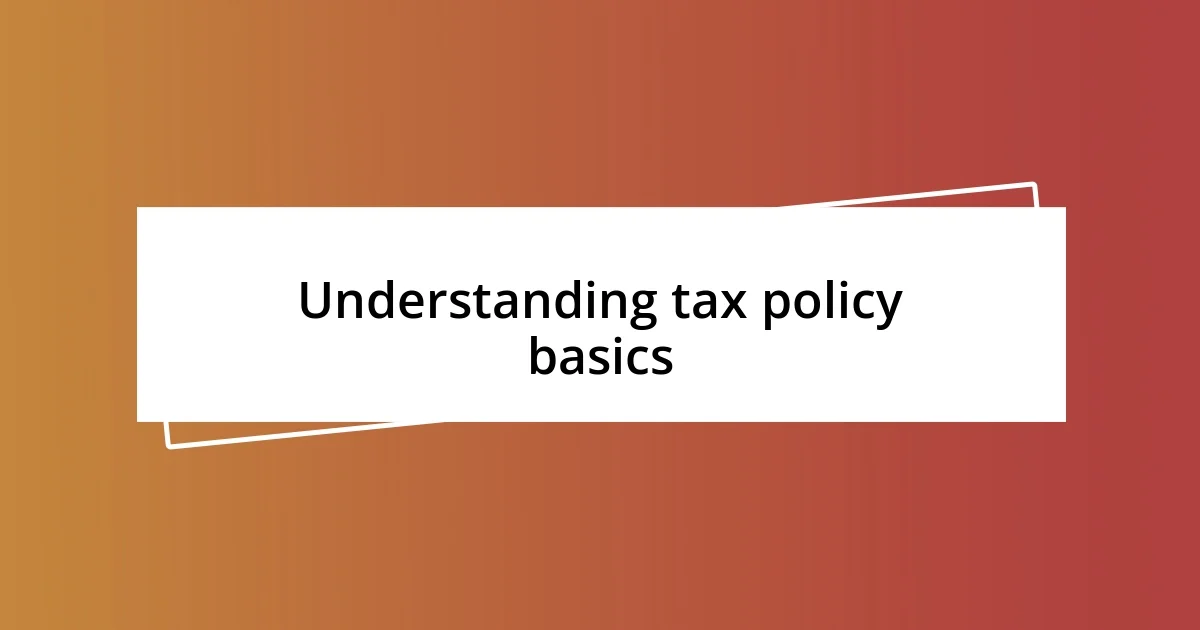
Understanding tax policy basics
Understanding tax policy can feel like navigating a dense forest—overwhelming and riddled with complexities. I remember my first tax return, staring nervously at forms that seemed to speak a language of their own. Why are there so many rules? It’s a common question, and the answer lies in the intricate balance governments attempt to strike between funding public services and ensuring fairness.
As I dove deeper into tax policies, I discovered that at their core, they are designed to fund everything from education to infrastructure. It’s fascinating, really—these policies shape our everyday lives, often in ways we don’t fully appreciate. How many of us consider the connection between our taxes and the roads we drive on? I certainly didn’t until I began to unravel these connections.
The emotional weight of understanding tax policy can be significant. I felt a sense of empowerment when I grasped how deductions and credits could lower my tax bill. It’s like realizing you have been handed a secret map that can help you navigate not just your finances, but understand how the broader economy works. What if you could demystify your own taxes? That realization can transform anxiety into confidence, allowing you to make informed decisions rather than feeling at the mercy of the system.
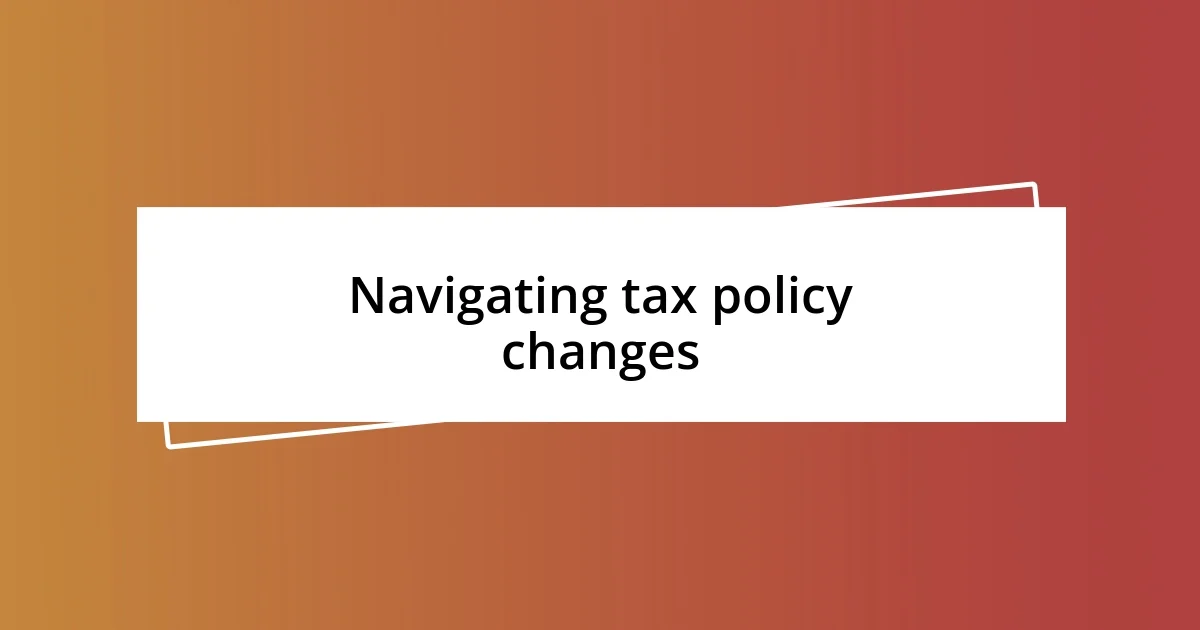
Navigating tax policy changes
Navigating tax policy changes can be a bit like trying to find your way through a maze. I remember feeling lost when new deductions were introduced, and I wasn’t sure how they would impact my situation. By actively seeking out expert advice and reading up on reliable resources, I found that staying updated is crucial. This approach allowed me to adapt and maximize benefits, which was a relief.
As I became more comfortable with the shifts in tax policy, I realized it also offered a sense of control over my finances. For instance, understanding how changes related to retirement contributions affected my long-term savings provided a broader perspective. I recall a moment when adjusting my contributions led to a significant boost in my retirement account. It’s empowering to leverage these policies for your financial advantage.
In comparison, the experience of adapting to tax changes can vary across individuals, depending on their unique circumstances. I found that while some individuals feel overwhelmed and anxious, others thrive on proactive research and adaptation. Having a clear strategy, being informed about potential changes, and being open to adjusting your approach can truly make a difference in how you handle your taxes moving forward.
| Experience | Response to Tax Policy Changes |
|---|---|
| Feeling lost | Seek expert advice |
| Feeling empowered | Adjust strategies proactively |
| Overwhelmed | Research and educate |
| Thriving | Embrace new opportunities |
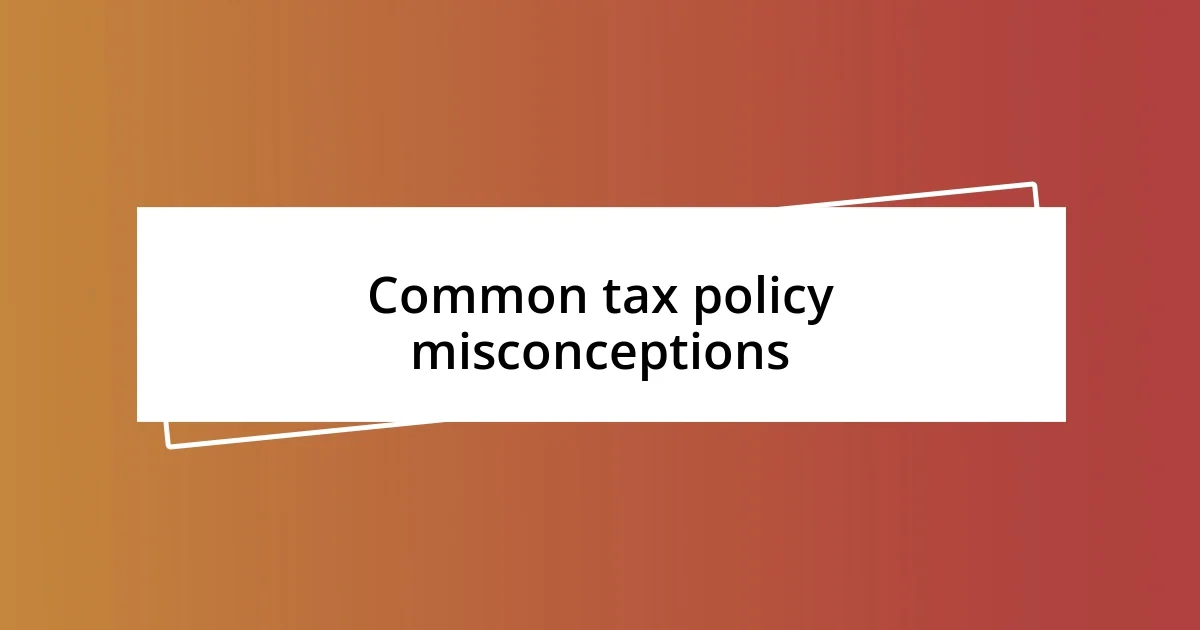
Common tax policy misconceptions
It’s easy to fall prey to common misconceptions about tax policy. One that caught me off guard early on was the belief that all income is taxed at the same rate. I once thought my entire salary was hit with the same tax percentage, but learning about tax brackets—where only the amount over a certain threshold is taxed at a higher rate—completely changed my perspective. It’s reassuring to know that the system aims for fairness by ensuring that people with higher incomes contribute proportionally more.
Here are a few lingering misconceptions I’ve encountered:
- All income is taxed the same: Tax brackets mean only the income above certain limits is taxed at higher rates.
- Deductions reduce taxes dollar-for-dollar: Deductions lower taxable income, but the actual savings depend on your tax rate.
- You can’t revise your tax return: Many people can amend their returns if they realize they made a mistake or missed a deduction.
- Only the wealthy pay taxes: Everyone contributes, and many low-income individuals pay sales tax and other indirect levies.
- Tax refunds mean you’ve overpaid: A refund is essentially an interest-free loan to the government; it means you didn’t fully utilize your withholding throughout the year.
Understanding the nuances behind these misconceptions helped me grow financially and emotionally. Initially, I felt overwhelmed by so many rules, but as I grasped the logic behind them, I found comfort in approaching tax season with not just knowledge but also a sense of possibility. Each misconception debunked added clarity and confidence to my financial decisions.
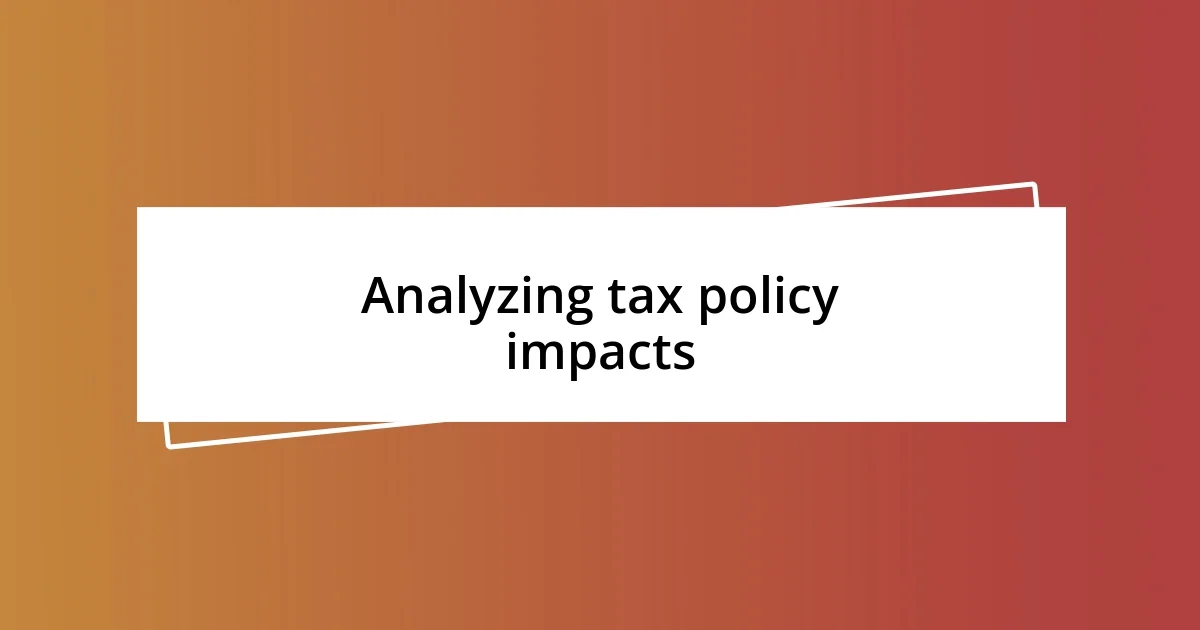
Analyzing tax policy impacts
Analyzing the impacts of tax policy can sometimes feel like dissecting a complex puzzle. I remember a time when a particular change in the capital gains tax rate made me question my investment strategy. I found myself weighing the short-term gains against potential long-term liabilities, and let me tell you, I spent plenty of sleepless nights pondering my next move. It’s fascinating how an adjustment in policy can ripple through your financial decisions, prompting you to rethink everything from asset sales to retirement plans.
These tax impacts reach beyond just financial calculations; they can shape our emotional landscape as well. For instance, I distinctly recall feeling a mix of anxiety and excitement when a proposal for a new tax credit for renewable energy investments emerged. In that moment, I saw an opportunity to not only save money but also align my investments with my values. Have you ever experienced a similar moment of clarity where finances and personal beliefs intersect? It’s these instances that highlight the powerful interplay between tax policy and our lives.
Moreover, the effects of tax policy can vary dramatically based on individual circumstances. I’ve seen friends who are small business owners navigate the anxieties of potential tax reforms, wrestling with what it could mean for their operations. Those moments taught me the importance of community feedback when analyzing the broader impacts of tax changes. Isn’t it remarkable how a shared concern can bring people together and create discussions that lead to informed decisions? Understanding these diverse perspectives not only enhances my analysis but also reinforces the idea that tax policy truly impacts us all in different ways.
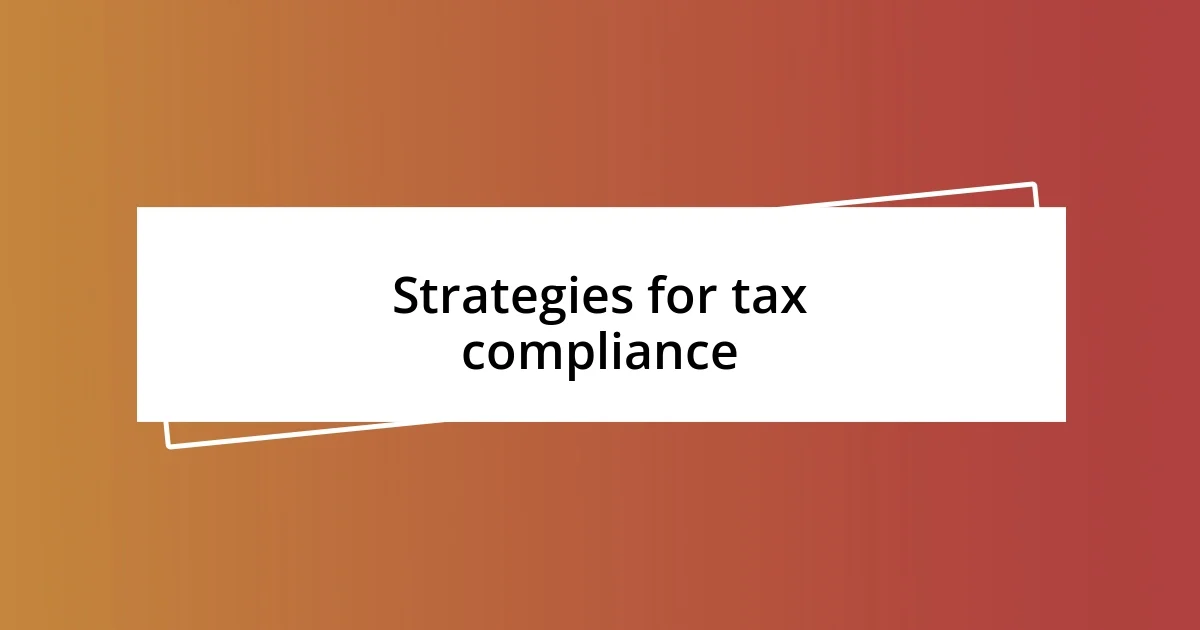
Strategies for tax compliance
Tax compliance can feel daunting, but I’ve discovered some strategies that help simplify the process. One tactic I swear by is keeping meticulous records. I invested in a good filing system—both digital and physical—to organize receipts and documents throughout the year. This saved me countless hours during tax season and brought a sense of calm knowing everything was in its place. Have you ever found peace in organization? Trust me; it makes a world of difference.
Another strategy is to stay informed about tax law changes. I remember feeling lost every time I received news of policy updates, but now I make it a point to read newsletters and follow credible tax blogs. By doing this, I not only stay compliant but also find opportunities I might have otherwise missed—like the time I discovered a new deduction that significantly reduced my tax liability. Awareness truly is power. How does keeping updated on tax laws impact your financial planning? I’ve found that it empowers me to make smarter decisions.
Lastly, I recommend leveraging technology to streamline tax compliance. Using tax software has been a game-changer for me. I recall the stress of calculating taxes manually and the fear of making mistakes—it feels like walking a tightrope. Now, with automated calculations and guided prompts, I feel much more in control. Have you ever felt that sense of relief when technology eases a complicated process? Technology continues to evolve, and embracing these tools helps demystify tax compliance and make it approachable for everyone.
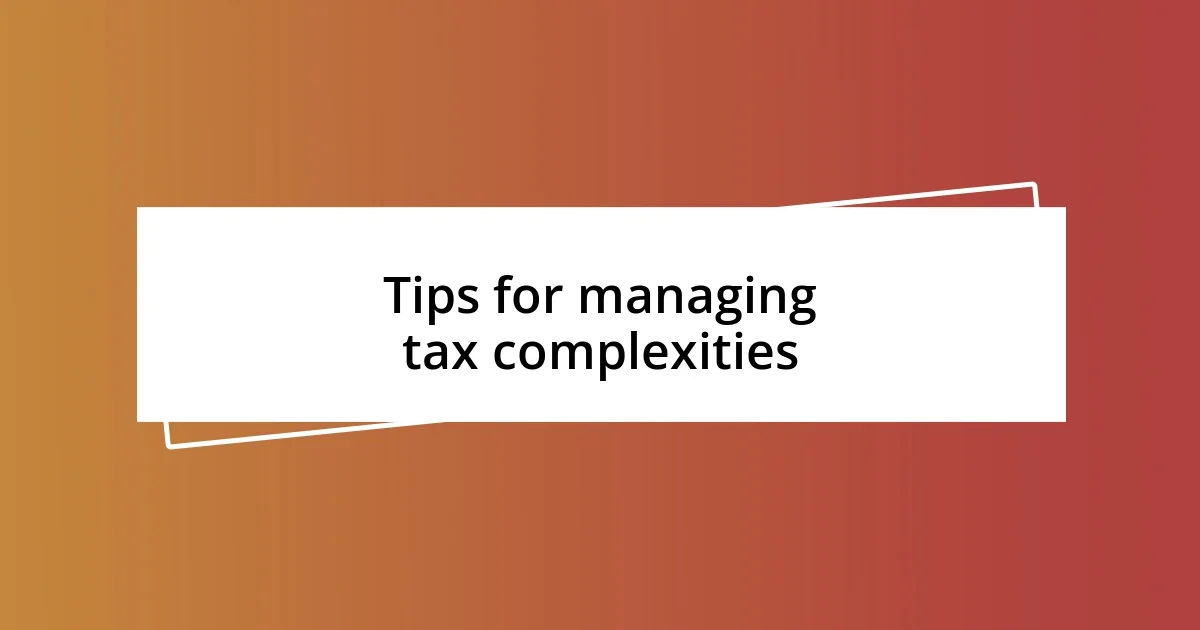
Tips for managing tax complexities
Managing the complexities of taxes can often feel like navigating a maze, but I’ve developed a few strategies that truly help me stay on course. One key tip is to categorize my expenses as I go along. I remember when I first started doing this—it transformed my approach. By breaking down spending into categories like business, personal, and investments, I not only simplified my tracking but also made tax time less like a frantic scavenger hunt. Have you ever experienced that “aha!” moment when you finally find a method that clicks?
It’s also incredibly beneficial to engage with a tax professional, especially when your situation becomes a bit too intricate. I once hesitated to enlist help, thinking I could manage everything myself. However, once I took the plunge and consulted with a tax advisor, I realized how much I had been missing out on—like those lesser-known credits that could save me significant money. Isn’t it amazing how a second pair of eyes can uncover opportunities you might have overlooked?
Lastly, I encourage everyone to have a long-term tax strategy in place. I learned this the hard way when a surprise tax bill knocked me off balance one year. Now, I create projections based on potential income shifts and planned deductions. This proactive approach allows me to prepare for fluctuations and keeps anxiety at bay. How do you plan for the unexpected? For me, being prepared makes all the difference in how I handle tax complexities.
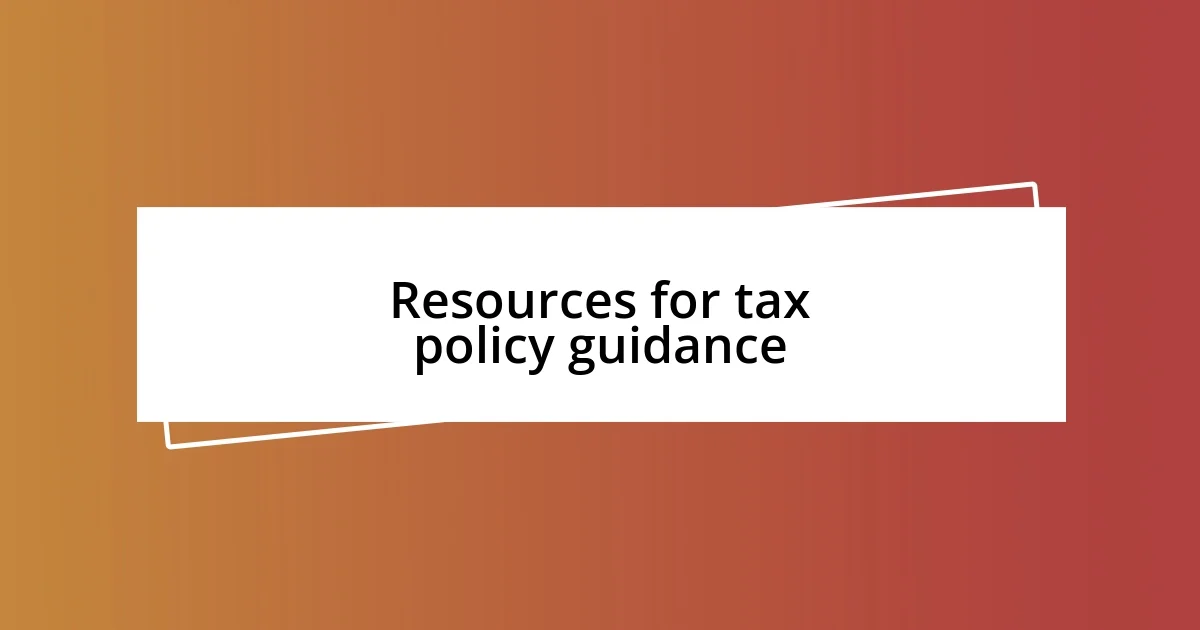
Resources for tax policy guidance
Finding the right resources for tax policy guidance can significantly ease the stress of navigating complex regulations. I’ve often turned to online platforms that specialize in tax advice, such as the IRS website, which provides a wealth of information straight from the source. When I first encountered this, I was surprised by how many helpful materials were available—like interactive tools and FAQs—that made understanding tax requirements feel less intimidating. Have you ever felt relief at discovering a resource that simplified something you dreaded?
In addition to official sources, I find peer networks incredibly valuable. When I joined a local tax discussion group, I was amazed at how sharing experiences with others uncovered insights I hadn’t considered. One memorable conversation revolved around interpreting ambiguity in recent tax legislation, and I left with a clearer understanding and newfound confidence. Sharing thoughts and experiences makes tackling tax policy feel collaborative, doesn’t it?
Finally, don’t underestimate the power of quality literature on tax policy. I still remember picking up a well-reviewed book on tax strategy that completely shifted my perspective. It was as though I had been handed a roadmap to a territory I thought was wildly chaotic. Each chapter revealed actionable strategies and real-world examples that resonated with my own challenges. What resources have you discovered that have changed your approach to taxes? For me, investing time in the right reading materials has proven invaluable.














